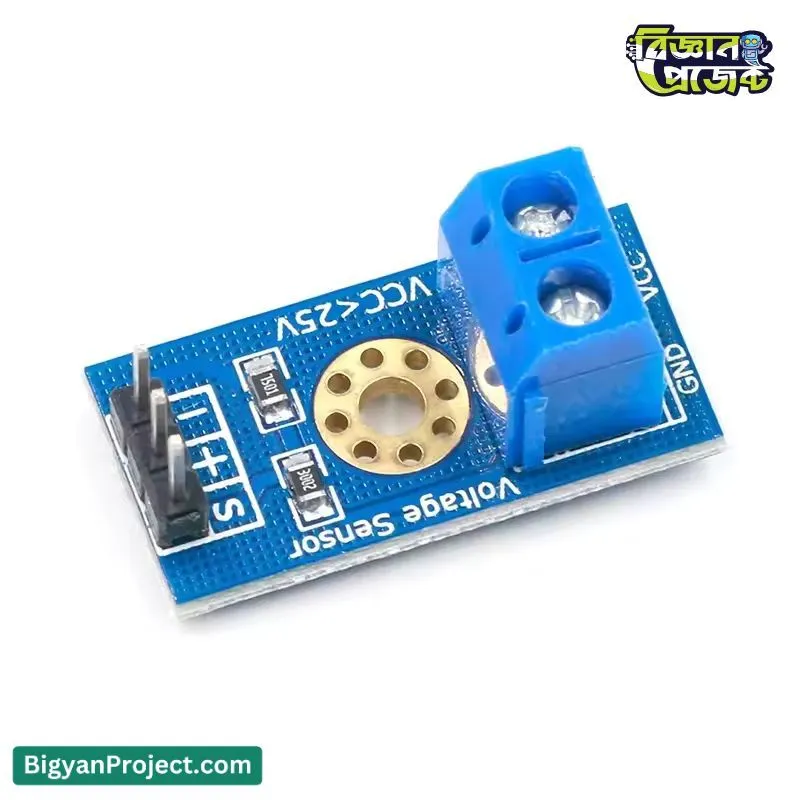























Easily and accurately measure DC voltages in your electronics projects with our Voltage Sensor Module. This compact and beginner-friendly module is an essential "electronic building block" for any DIY hobbyist, student, or electronics enthusiast. Based on a simple but reliable 5:1 resistive divider principle, it safely scales down a higher input voltage (from 0V to 25V) into a range that microcontrollers like Arduino, Raspberry Pi, or ESP32 can safely read through their analog pins.
It’s the perfect tool for creating projects like a battery level indicator for your 18650 or LiPo battery packs, monitoring a power supply's stability, or building a custom digital voltmeter. Forget complex circuit design; just connect three pins (Signal, VCC, GND) and start measuring!
Unlock the full potential of your microcontroller projects with the DC Voltage Sensor Module, a fundamental component for any electronics enthusiast, student, or DIY builder in Bangladesh. Often, microcontrollers like the popular Arduino Uno can only read small voltages (0-5V). This creates a challenge when you need to measure higher voltages from sources like batteries, power supplies, or solar panels. This module, available from Bigyan Project, is the perfect plug-and-play solution. It is expertly designed based on the resistive voltage divider principle, safely scaling down a DC input voltage of up to 25V by a factor of five. This brings the voltage into the safe analog reading range of your microcontroller's ADC (Analog-to-Digital Converter), allowing you to incorporate real-world voltage data into your projects with ease and precision. It's an indispensable tool for moving beyond basic digital projects into the fascinating world of analog electronics.
| Product Name | DC Voltage Detection Sensor Module |
| Input Voltage Range | DC 0V - 25V |
| Voltage Detection Principle | 5:1 Resistive Voltage Divider |
| MCU System Voltage | Compatible with 5V or 3.3V systems |
| Special Note for 3.3V Systems | For 3.3V MCUs (like ESP32, Raspberry Pi), the maximum safe input voltage is 16.5V (3.3V x 5). |
| Output Type | Analog Voltage Signal |
| Analog Resolution (with Arduino) | 0.00489V (5V / 1023) at the ADC pin |
| Input Voltage Resolution | 0.02445V (0.00489V * 5) |
| Dimensions | Approx. 28mm x 14mm |
| Operating Temperature | -40°C to +85°C |
This versatile module from বিজ্ঞান প্রজেক্ট can be the core of countless projects, including:
Getting started with the Voltage Sensor Module is straightforward. Follow these steps:
void setup() {
// Initialize serial communication at 9600 bits per second:
Serial.begin(9600);
}
void loop() {
// Read the analog value from the sensor (connected to A0)
int adc_value = analogRead(A0);
// Convert the analog value (0-1023) to a voltage (0-5V)
float adc_voltage = (adc_value / 1023.0) * 5.0;
// The sensor divides the input voltage by 5, so we multiply by 5 to get the real voltage.
float input_voltage = adc_voltage * 5.0;
Serial.print("Input Voltage: ");
Serial.print(input_voltage);
Serial.println(" V");
delay(1000); // Wait for a second before the next reading
}
The DC Voltage Sensor Module is more than just a component; it's a gateway to more advanced and practical electronic projects. Its simplicity, reliability, and wide range of applications make it an essential item in every hobbyist's toolbox. Whether you're building a battery monitor, a custom power supply, or simply learning about analog electronics, this module provides the functionality you need. Order yours from Bigyan Project today and take the next step in your electronics journey.
Voltage Sensor Module, Voltage Detection Module, Arduino Voltage Sensor, DC 0-25V, Resistive Divider, Voltage Divider Module, HW-107, Voltage measurement for Arduino, Battery level sensor, Arduino Voltmeter, Raspberry Pi voltage sensor, ESP32 ADC, Electronics Components BD, DIY electronics Bangladesh, Bigyan Project, বিজ্ঞান প্রজেক্ট, voltage sensor price in bd
Important Information
The product details on this page are collected from multiple reliable sources to provide you with the best information. However, minor discrepancies may occur. We recommend thoroughly checking the product labels, instructions, and warnings before use.
Note: Images shown are for illustration purposes only and may slightly differ from the actual product.
The latest price of Arduino DC Voltage Sensor Module (0-25V) for DIY in Bangladesh is ৳75 Taka. You can buy the Arduino DC Voltage Sensor Module (0-25V) for DIY at best price from বিজ্ঞান প্রজেক্ট.